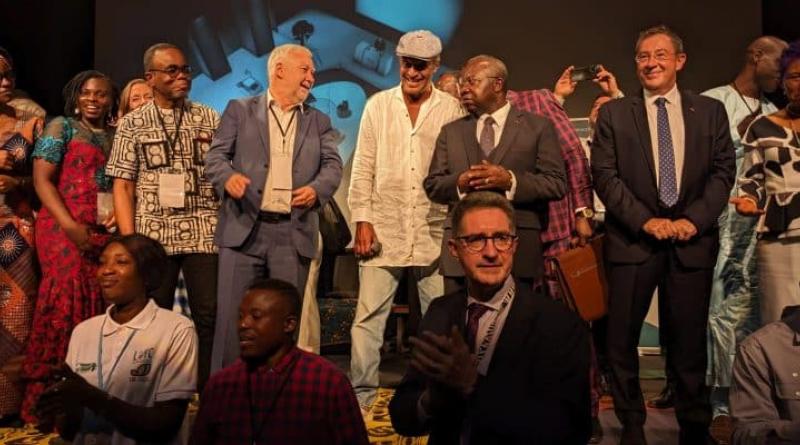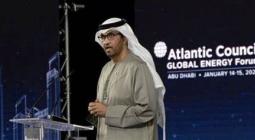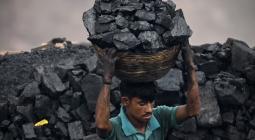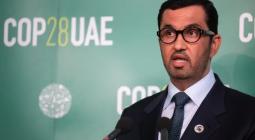Climate Chance: African non-state actors’ position for COP28 known

The fifth Climate Chance Africa Conference (CCCA2023) came to a close on 24 October 2023 against the backdrop of the adoption of the Yaoundé Roadmap for sustainable housing and climate resilience on the continent. The document, drawn up by experts and local elected representatives, will be used as a "solid and concrete" proposal by non-state actors at forthcoming global meetings, starting with the 28th Conference of the Parties on Climate Change (COP28) in November.
From 23 to 24 October 2023 in Yaoundé, Cameroon, the two days of the Climate Chance Africa Conference (CCCA2023) will have been insufficient for participants to exhaust their thoughts on the thorny subjects of decent housing, urban planning and decentralised cooperation for the climate. But the hardest part was finally worked out and adopted: the Yaoundé Roadmap for Sustainable Housing in Africa. Presented as a “landmark” document for the continent, it sets out in just six pages the recommendations made by non-state actors to accelerate sustainable urban development.
It identifies a number of obstacles, including planning that has been overtaken by the speed of urbanisation and demographics, a shortage of decent and affordable housing, the explosion in informal housing, the lack of available and reliable data to develop appropriate urban planning policies, and inadequate coordination between local and national levels. These challenges are compounded by financial issues such as the poor access of African cities to international funding, the inadequacy of national budgets allocated to African cities, low levels of private investment and the “inability of local governments to mobilise local taxation”.
Among the recommendations made by the participants at this fifth conference are the promotion and integration of local materials and processes into construction policies, and the mobilisation of financial resources to enable local authorities to invest more in renewable energies in the face of the current energy deficit. But it is above all the “strengthening of local authorities” that is the priority action to be taken, as explained by Ronan Dantec, President of the Climate Chance association, and Luc Gnacadja, former Environment Minister of Benin.
COP28 on the horizon
Beyond this meeting, which took place at the Institut français du Cameroun (IFC), the signal sent out is that Africa is strong and more prepared than ever to make its voice heard at the forthcoming international discussions on the ecological transition. First and foremost at the 28th Conference of the Parties on Climate Change (COP28), which opens on 28 November 2023 in the United Arab Emirates (UAE). The Yaoundé Roadmap therefore appears to be a concrete proposal from the continent for the forthcoming meeting in Dubai, particularly with regard to the 11th Sustainable Development Goal (SDG11), which focuses on inclusive and sustainable cities.
To achieve this, Thierry Marchand, the French ambassador to Cameroon, and even Yannick Noah, the tennis player, musician and promoter of ecological cultural spaces, are all unanimous, whether in their diplomatic speeches or in their melodies: we need to include the people to build a liveable environment that is in tune with nature. A call put differently by the former Beninese Minister for the Environment: “Today, we can no longer do urban planning without including the local population”, insists Luc Gnacadja.
Funding at half-mast… a year before the World Urban Forum in Cairo
For other players such as Augustin Tamba, President of the Association of United Councils and Cities of Cameroon (UCCC), funding is the sinews of war. He deplored the slow progress made on the $100 billion pledged by the countries of the North as part of the Paris Agreement, which was intended to build resilience in “non-polluting countries suffering from climate shocks”. This issue will undoubtedly be at the heart of the 12th World Urban Forum (WUF12) to be held in Cairo in November 2024.
Local elected representatives, particularly in Africa, are struggling to implement international resolutions on mitigating and adapting to climate change, due to a lack of funding. In Egypt, where the Climate Chance Roadmap will also be the focus of discussions, all eyes will be on the major industries, which have long been expected to make a statement on their official capital contribution to this impasse. There are also those development partners and commercial banks who are being singled out for their reluctance to finance green projects led by local authorities. The coming months therefore promise to be decisive for these donors, who are also being asked to reform in order to achieve the 17 SDGs by 2030.






